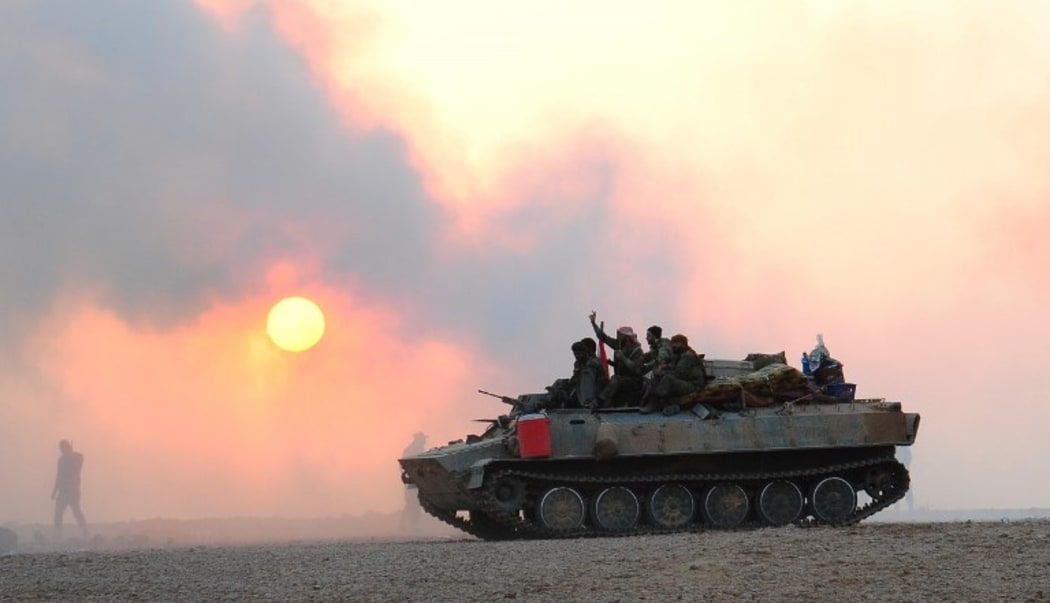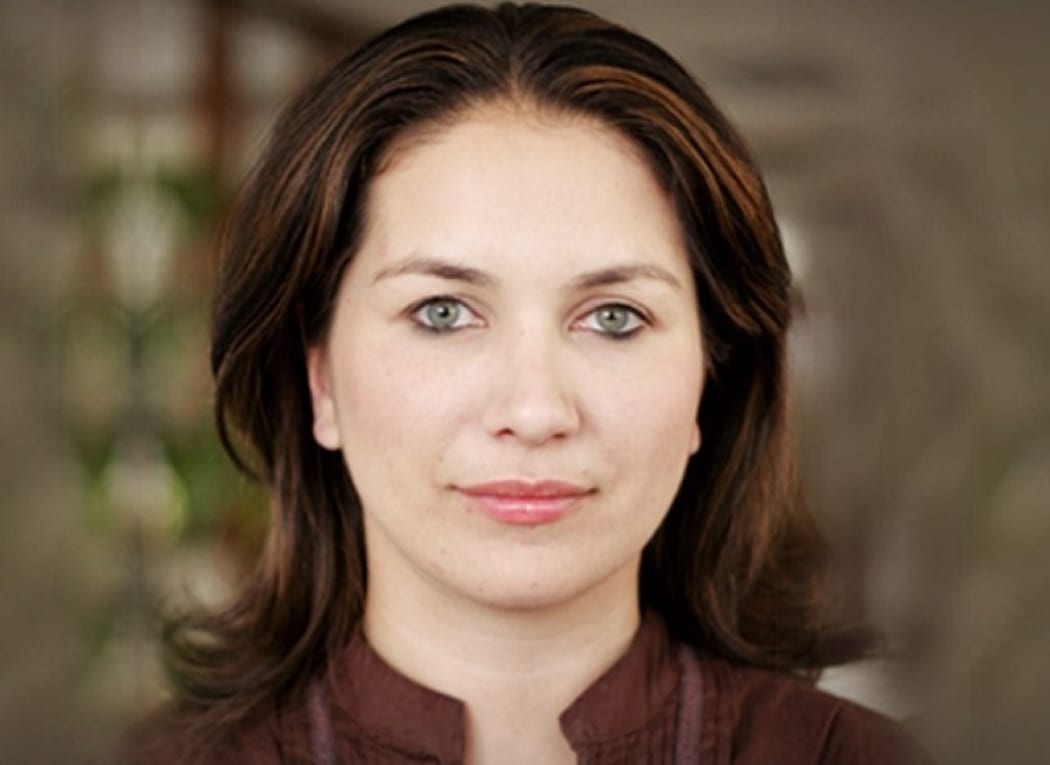Far from being defeated, as President Trump recently stated, ISIS has 20,000 to 30,000 fighters still alive and taking part in the jihad, a New York Times correspondent says.
Rukmini Callimachi is the New York Times’ foreign correspondent covering Isis and Al-Qaeda and hosts the popular podcast Caliphate.

A tank in the city of al-Bukamal, an Islamic State stronghold in eastern Syria. Photo: AFP / FILE
Callimachi says the last time Isis was declared defeated – in 2010 by the CIA – the group had an estimated 700 fighters left. Today that figure is much higher.
“It’s not just my assessment, it’s the assessment of three independent bodies that published reports shortly before President Trump made this surprising announcement. The Pentagon Inspector General, The United Nations, and CSIS – which is a well-known think tank in America – all put out reports stating that, just in Iraq and Syria, Isis is believed to have somewhere between 20,000 and 30,000 fighters still alive and taking part in the jihad. This is an enormous number,” she tells Charlotte Graham-McLay.
Callimachi has spent thousands of hours embedded in Isis chatrooms and said the response to Trump’s announcement was one of mockery.
“Isis followers and acolytes feel as if they’ve won. They know that their group is not over, and hearing the President of the free world make this uninformed statement is, to them, a form of victory.”
Isis have lost 99 percent of the territory they once held in Iraq and Syria but she stresses it’s always been a global enterprise. The group still has territory in Afghanistan, the Sinai, West Africa, Libya, the Philippines, and other areas.
Callimachi says the group is now fighting for survival in Iraq and Syria and advisers are telling Trump they’re worried that if they turn their backs now, Isis will be back in full force by 2020. She says military leaders want constant pressure on the group.
’He became very upset’
Callimachi has gained access to hundreds of documents showing the inner workings of the group. She has also managed to conduct interviews with fighters, resisters and victims of Isis. She says the biggest problem with coverage of Isis is that most journalists don’t go to the terrorist group itself.
“They don’t know how, and they don’t even see that as a fruitful endeavour,” she says.

Photo: Rukmini Callimachi
“All of their information is coming from governments, and we forget that governments are a party to this conflict. Governments have a reason to say certain things about Isis. Governments want us to believe that this group has been defeated and obliterated, as we’re hearing now from the White House, because that particular narrative is politically expedient. No politician can be in office and can be seen to have allowed a terrorist threat to flourish.”
During the making of her podcast Caliphate, Callimachi interviewed a Canadian man, Abu Huzaifa, who joined Isis and travelled to Syria where he claims to have killed two people. He says he later became disillusioned with the group and returned to Canada via Pakistan believing he had evaded detection by the authorities.
Callimachi says only 12 hours after interviewing Huzaifa, Canadian intelligence officials came banging on his door and he was taken into custody.
“Everything changed for him from that point on. Within a day of me collecting that interview, he was in a very different space mentally and was very worried that he might have to eventually go to jail.
“The window when I went to see him essentially created an openness in him. I do think that in the moment that he spoke to me he felt sincerely remorseful for some of the things he had done. He was looking to unload. He told me he was looking for closure.”
Callimachi says that when the Canadian authorities began to question him, he changed. “He became defensive. He became very upset.”
She was also able to interview young Yazidi women who had been taken and kept as sex slaves by Isis.
One of the interviews was with a woman who couldn’t hold up her own head and only answered in whispers. Another one was put on speaker phone during a prison interview with her rapist so that she could fact check what he was saying.
She says she was proud of the way the interviews were conducted and that the women had wanted to tell their stories and were consulted throughout the entire process.
“The thing that is important to me when you’re dealing with a victim of rape is to make sure that you have true consent.”
Callimachi says when they arrived at the camp to do interviews, they chose not to talk to people who were resistant to the idea. She says the women wanted the world to know what had happened to them.
In the case of the women put on the phone with her rapist, she hadn’t known he was in custody until the interview and it helped her to confirm he was not in the community. Callimachi says she had spoken to community leaders and her family to make sure it was something she was comfortable doing.
“For her, it was essentially a way to put a bookend on this horrible experience. To really hear that he was in jail and to tell him what she thought of what he had done to her.”
Callimachi said she spoke to the girl a few weeks later and she said she was glad she had done the interview.
Her reporting on Isis has made her enemies within the group, and Callimachi has been told by the FBI about threats to her and her husband’s life. However, she says the work is still worth it.
“But it’s worth it for me because I feel like I’m making a dent in it. I feel like I’m making a difference. I can see how the work I’m doing is changing the conversation about this group. It’s bringing nuance where there wasn’t nuance before. It’s bringing grey where there was only black and white. I think that’s meaningful. I think that’s a worthwhile contribution.”
Related stories
Rukmini Callimachi is a three-time Pulitzer Prize finalist, and prior to the the New York Times she reported for the Associated Press in West Africa.

